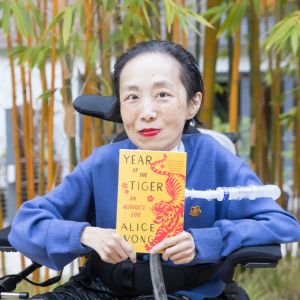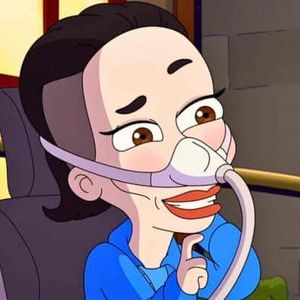I loved reading Alice Wong's books: Disability Visibility, a collection of essays by disabled people; and Year of the Tiger, her own memoir focused on her life as a disability justice activist. She is an excellent writer with a fascinating background.

However, when Wong announced that she would appear in season 2 of Human Resources, playing a character "loosely based" on herself, it made me nervous.
Previous cartoons aimed at adults haven't got a great record of featuring disabled characters. Most often, they're skipped entirely, but when they are included, the results can be worse.
Some are there for the purpose of a single joke, and the disability is the only aspect of their personality that we ever see. For example, The Simpsons featured Kevin, a blind Springfield Elementary student. He's involved throughout the episode, and his blindness is central to a single joke which doesn't progress the story at all.
Other representations are bad, potentially offensive stereotypes, like Timmy from South Park. I've not watched very much South Park, but every memory I have of Timmy is limited to him yelling his own name.
And there are the cameos. For example, the late Stephen Hawking appeared in several episodes of The Simpsons. It was nice to see the focus not on the disability, but again, we were limited to a single aspect of his personality, this time the 'smart guy astrophysicist'.
This is exactly what I expected from Human Resources.
It's not a show that everyone will love. The series feels like it hinges on jokes about ejaculation and characters performing sex acts on one another in the office, yet it still manages to deal sensitively with some big topics. I struggled to imagine anyone writing a disabled character with more than one dimension to fit into this world.
And yet, in an episode called The Tell-Tale Dick, when we first meet Alice, it quickly became clear she wasn't the usual one-dimensional disabled character I'd come to expect. We meet her preparing for a date. One of her first lines is "disabled people do not need your pity, especially me, I'm fucking perfect", shortly followed by "if he likes giving oral, I'm marrying him". We have a character who is both embracing her identity as a disabled person, while also being relatably human.
Alice, the character, returns throughout the season. She deals with human experiences around anger, hate, disappointment and love. Her stories also touch on highly disability-specific topics, including ableist parents' attitudes, activism, step-free access and having to fight for equal opportunities. There is also a subplot concerning a four-year-old who is described as "neurodiverse" and "nonspeaking", which raises some really important points which come up time and time again in the disability rights world.
It was clear, even before spotting it in the show's credits, that Wong was not only the voice actor and inspiration here, but was actively involved in creating the story.
I don't love the show, but for me, it was worth putting up with the zombie penises and the monster orgies to follow the story of Alice, who is the most authentic disabled character I've ever seen on an animated show.
Header image taken from Netflix. Photograph of Alice Wong by Eddie Hernandez Photography, via the Disability Visibility Project.
